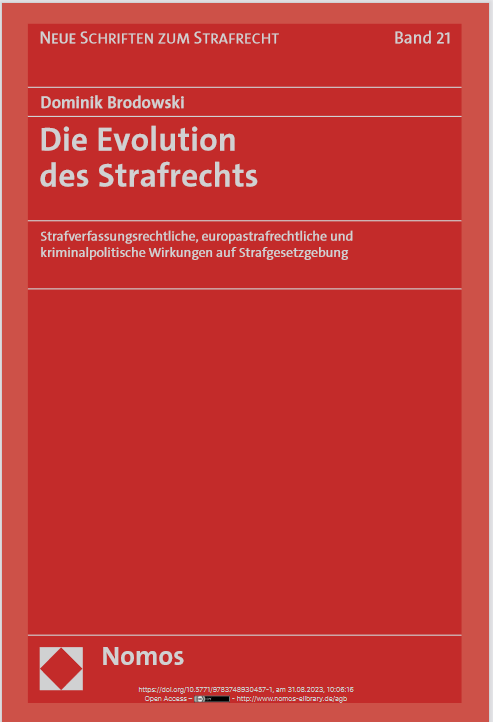News and Events
New publication: Dominik Brodowski, Die Evolution des Strafrechts. Strafverfassungsrechtliche, europastrafrechtliche und kriminalpolitische Wirkungen auf Strafgesetzgebung.
 After the manuscript on the evolution of criminal law, written by Dominik Brodowski, was accepted as a habilitation thesis in 2021, the updated version can now be read by the interested (German-speaking) public. The updated version takes into account literature and case law up to January 2023.
After the manuscript on the evolution of criminal law, written by Dominik Brodowski, was accepted as a habilitation thesis in 2021, the updated version can now be read by the interested (German-speaking) public. The updated version takes into account literature and case law up to January 2023.
On average, the StGB, the core codification of substantive criminal law in Germany, is amended six times a year. Such changes in substantive criminal law – but also the absence of changes – are brought about and limited along various paths by (criminal) constitutional law, by European and international guidelines and by criminal policy. In this paper, the (criminal) constitutional law, European (criminal) law and (criminal) policy lines of influence on the current development of substantive criminal law in Germany are examined and conclusions for the (dynamic) determinacy of criminal provisions are developed from this.
New Publication: Dominik Brodowski/Jonas Nesselhauf/Florian Weber (Hrsg), Pandemisches Virus – nationales Handeln. Covid-19 und die europäische Idee.
 With the spread of Covid-19 from spring 2020 onwards, a watershed occurred that brought with it effects from the global to the local. While there was initially hope that the novel virus could be restricted to the area in and around the Chinese city of Wuhan, this hope had to be given up by March 2020 at the latest, as evidenced by impressions of uncontrollable corona hotspots, amongst others in Europe and the USA. With quarantine measures, contact reductions and in some cases exit restrictions, political decision-makers took similar measures that deeply intervened in the socio.politically established normality. Within Europe, many countries reacted – in addition to restrictions on entry into the Shengen area – with increased border controls and in some cases with border closures, which counteracted the idea of open internal borders and freedom of movement within the European union. A focus on the national was also evident in the temporary prohibition or impediment of the export of medical supplies abroad, as well as in the increased demand for, and in some cases the realisation of, fragmented national responses, for example in the procurement of vaccines. In this way, the very foundations of the European idea were attacked. At the same time, demonstrations of solidarity and protest at the level of civil society testified to the fact that a Europe of open international borders should be preserved. The introductory article outlines the central milestones of how SARS-CoV-2 ‘undermined’ apparent certainties. This is followed by a focus on key questions and issues that form the basis for an overview of the contributions in this anthology.
With the spread of Covid-19 from spring 2020 onwards, a watershed occurred that brought with it effects from the global to the local. While there was initially hope that the novel virus could be restricted to the area in and around the Chinese city of Wuhan, this hope had to be given up by March 2020 at the latest, as evidenced by impressions of uncontrollable corona hotspots, amongst others in Europe and the USA. With quarantine measures, contact reductions and in some cases exit restrictions, political decision-makers took similar measures that deeply intervened in the socio.politically established normality. Within Europe, many countries reacted – in addition to restrictions on entry into the Shengen area – with increased border controls and in some cases with border closures, which counteracted the idea of open internal borders and freedom of movement within the European union. A focus on the national was also evident in the temporary prohibition or impediment of the export of medical supplies abroad, as well as in the increased demand for, and in some cases the realisation of, fragmented national responses, for example in the procurement of vaccines. In this way, the very foundations of the European idea were attacked. At the same time, demonstrations of solidarity and protest at the level of civil society testified to the fact that a Europe of open international borders should be preserved. The introductory article outlines the central milestones of how SARS-CoV-2 ‘undermined’ apparent certainties. This is followed by a focus on key questions and issues that form the basis for an overview of the contributions in this anthology.
07.03.2022 – 30.01.2023
Series of lectures and talks about the war in Ukraine

Foto: J. Pütz
The Russian war of aggression on Ukraine is shaking Europe. This war, which is also directed against Ucraine’s orientation towards Europe and the West and is being fought on the backs of the Ukrainian population, seems to be leading to ‘Europe’ growing closer together. For the purpose of European Studies classification and accompaniment, Saarland University has organised a series of events on the war in Ukraine and its effects of Europe. The current situation and its consequences as well as the identity-forming function of ‘Europe’ in this conflict were examined in lectures and panel discussions, from historical, legal, media, ethical and political science perspectives, among others.
Scholars from Sarland University participated in the series of events. International guests were also involved, including academics and students affected by the war.
The Events were prepared by the Cluster for European Research (CEUS), in cooperation with the RZE, Europa-Institut and Frankreichzentrum of Saarland University and with the Center for Border Studies of The UniGR.
